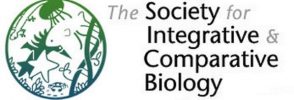Contents
- Message from the DEDE Officers
- Annual Meeting of SICB 2023
- DEDE 2023 Awards
- First Time Student Experiences at SICB 2023
- Featured Student Talk
- Meet An Ecoimmunologist/Disease Ecologist
- Looking Ahead: SICB 2024 (Seattle, WA) & SICB 2025 (Atlanta, GA)
- Outgoing DEDE Officers
- 2023 DEDE Elections
- DEDE Secretary-Elect Candidates
Message from the DEDE Officers
- Chair: Jim Adelman, chair.dede@sicb.org
- Chair-Elect: Lauren Fuess
- Program Officer: Daniel Becker, dpo.dede@sicb.org
- Secretary: Sarah Knutie, secretary.dede@sicb.org
- Student/Postdoctoral Affairs Committee Representative: Jenn Houtz, jlh498@cornell.edu (term will end soon because she starts a faculty job in the fall!)
Annual Meeting of SICB 2023
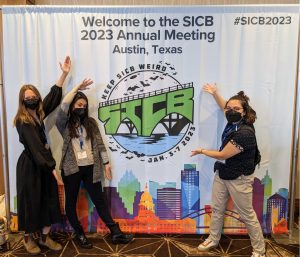
SICB had an amazing turnout in Austin, TX in January. We received 1800 abstracts, of which 709 were contributed posters, and 937 were contributed talks. We had submissions from 26 countries, and 1085 student presentations. Specifically, DEDE had 87 abstracts and 65 of those were from student presenters! We continued our annual tradition of hosting an oral presentation session dedicated to the DEDE Best Student Oral Presentation Competition. We had 8 incredible finalists. In addition, 13 students competed in the DEDE Best Student Poster. A special thanks to those who volunteered to judge student presentations; your participation and enthusiasm for judging our students makes this a seamless process and we couldn’t do it without you!
If you missed the DEDE Members Meeting in Austin, please look over the minutes of our meeting here, on our divisional website.
DEDE 2023 Awards
Best Student Presentation Awards
The winner of the DEDE Best Student Oral Presentation was:
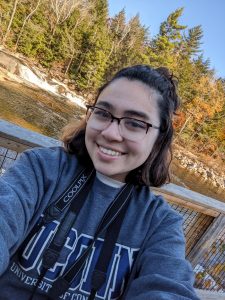
Sydney Horan
University of Connecticut
Talk Title: Beating the heat: Mechanisms mediating effects of temperature on host responses to parasitism
Sydney Horan is a Ph.D. student in the Knutie Lab at the University of Connecticut. At SICB 2023, they presented on the effects of heat on host responses to parasitism. Eastern bluebird nest boxes were experimentally manipulated with heat packs to raise the temperature. The ectoparasites in the host’s nests were then quantified, as well as the expression of host genes associated with temperature and immune response, such as interleukin-6 and heat shock protein 70 (HSP70). It was found that HSP70 expression increases with temperature, and IL-6 expression is negatively correlated with parasite species richness.
The winner of the DEDE Best Student Poster was:
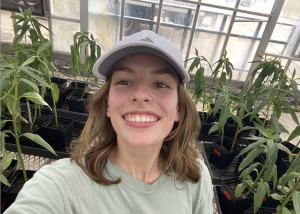
Anna Shattuck
Tulane University
Poster Title: The effect of infection on thermoregulatory behavioral fever of monarch butterfly caterpillars
Anna Shattuck’s research explores how organisms respond to infection. Infected ectotherms can display behavioral fever where the individual changes its thermal preference to promote survival. No experiment has tested if thermal preferences of monarch caterpillars (Danaus plexippus) vary based on infection with Ophryocystis elektroscirrha (OE). While Anna has found no evidence of behavioral fever in caterpillars thus far, she did find a positive relationship between temperature preference and weight. Looking forward, Anna plans to conduct more trials exploring how parasite dosage and time of day might influence thermoregulatory behavior of infected monarch caterpillars.
To see all the BSP awardees, click here: https://sicb.org/sicb-news/congratulations-sicb-2023-bsp-winners/
Lochmiller Young Investigator Award
Congrats to the second annual Robert Lochmiller Young Investigator Awardees! Named in honor of this seminal figure in ecoimmunology, this award recognizes distinguished contributions to the fields of ecological immunology and disease ecology. The depth and breadth of the nominees’ contributions were outstanding, highlighting an extraordinarily bright future for our fields. Moreover, this pool of impressive candidates, consisting entirely of women and members of other underrepresented groups, showcases DEDE’s commitment to promoting environments in which scientists from all backgrounds can excel.
We are pleased to announce that because of the extremely tight competition, this year we awarded two Lochmiller Awards. Drs. Lauren Fuess (Texas State University) and Gabrielle Names (North Dakota State University) will each receive this prize.
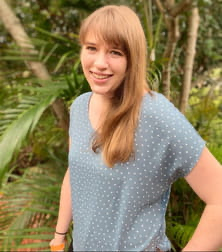
Dr. Lauren Fuess
Texas State University
https://fuesslab.wp.txstate.edu/
Lauren Fuess is an assistant professor at Texas State University. Her research focuses on understanding interplay between immunity and symbiosis from an ecological and evolutionary perspective. Specifically, her group is working to understand both the immunological consequences of symbiotic relationships, and how symbiotic relationships shape the evolution and diversification of immune systems. While she addresses these questions in a diversity of systems, most of her past and current work has focused on cnidarians and teleost fish. As a faculty member at a Hispanic Serving Institution, Lauren is also committed to working to increase equity and inclusion in STEM fields.
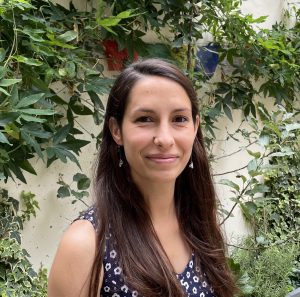
Dr. Gabrielle Names
North Dakota State University
https://www.linkedin.com/in/gabrielle-names-80a20813b
Gabrielle is an evolutionary ecologist who studies how introduced and spreading diseases affect the physiology and behavior of novel vertebrate hosts, with a focus on birds. She is currently a postdoctoral fellow in Dr. Britt Heidinger’s lab at North Dakota State University and will begin an assistant professor position at California Lutheran University this upcoming fall 2023. Her disease research focuses on the introduction of avian malaria to Hawaii and its impacts on the endemic avifauna. Gabrielle is committed to increasing diversity and inclusion in academia through her outreach, mentorship, and leadership.
Dorothy M. Skinner Award
Congrats to Dr. Tosha Kelly who is the 2023 winner of the Dorothy M. Skinner Award! The Skinner Award recognizes early career women ‘who have demonstrated outstanding scholarship and show high potential for continued excellence in research,’ and was presented to Dr. Kelly at the 2023 SICB meeting in Austin.
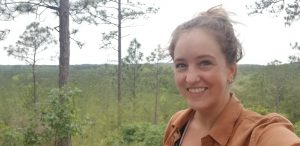
Dr. Tosha Kelly
Merck Research Laboratories Fellow with the Life Sciences Research Foundation. Post-doctoral Researcher at Louisiana State University. https://tosharkelly.wixsite.com/toshakelly
Individuals vary in behaviour, including aversive reactions to novelty (= “neophobia”), but the proximate causes of neophobia are poorly understood. We temporarily reduced circulating corticosterone in 11 male house sparrows (Passer domesticus) with mitotane and then examined their latency to feed when a novel object was presented on their food dish. Compared to controls, mitotane-exposed sparrows were four times more likely to feed from a food dish in the presence of a novel object, evidence for a role of glucocorticoids in meditating neophobia behaviour. Wild animals are increasingly subject to human-induced stressors that can cause glucocorticoid secretion, and our results suggest such increased glucocorticoid exposure may affect an individual’s ability to exploit new resources and avoid potential dangers.
This study is published in Hormones and Behavior: https://doi.org/10.1016/j.yhbeh.2021.105094, and could not have been completed without the help of all co-authors, including 3 undergraduate students.
John S. Pearse Student Research Award
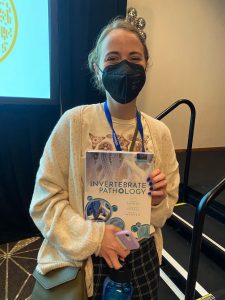
Student Research Awards are presented annually to SICB graduate students to support their research. A named award is established through donations to the Student Research Fund and recognizes an individual. John S. Pearse (1936-2020) was an authority on marine invertebrates and intertidal ecology. He spent his academic career at the University of California, Santa Cruz, where he was instrumental in establishing the marine science program. He earned his Ph.D. at Stanford University where he did some of the earliest marine biology research at Antarctica’s McMurdo Station. He was president of the Society in 2007 and 2008.
Madison Emery
PhD student
The University of Texas at Arlington
Proposal Title: “Investigating the viability of various immunostimulants to elicit immune priming in symbiotic cnidarians”
First Time Student Experiences at SICB 2023
We asked first-time attendees to tell us about their experience at SICB 2023. Here’s what Kyra and Isabela had to say and their advice to future first-time attendees!
Kyra Ricci
PhD Candidate, Jessica Hua’s Lab, University of Wisconsin, Madison
I had a great first experience at SICB. I went with a pretty big group from my lab, and I expected us to continue to run into each other at the same talks and events; I figured we would be drawn to the same things as we work in similar topic areas. However, I was pleasantly surprised to find that there were so many different topics that we all were able to tailor our schedules to our specific individual interests. We all ended up learning about very different things and making connections with different people that we were able to share with each other later, which was a lot of fun. I also thought everyone was very respectful and insightful when asking questions during the talks, which made me feel comfortable by the time it was my turn to present.
I especially enjoyed the focus on science communication and education throughout the conference. I think my favorite part was the science communication roundtable workshop – it was great to meet science communication professionals and see all of the interesting career paths and avenues that are available in that field.
One thing I wish I would have known how big the conference was going to be! This was my first national conference, so even though I read through some of the programming before arriving, the amount of people and things to do was way more than I expected. On the first day I thought I could check things out as I went, but I quickly figured out that it was hard to stay organized without planning ahead. On day two, I had a schedule of everything I wanted to do and had a much smoother experience after that!
Isabela Velasquez Gutierrez
PhD Student, Jessica Hua’s Lab, University of Wisconsin, Madison
As a first-time SICB attendee, I have to say that it was amazing! Unfortunately, I missed the first day of presentations due to travel issues, but the rest of the conference was incredible! I met so many people that are as passionate as me about amphibians and diseases! It gave me the opportunity to listen to other people’s research projects (which were amazing!) and expand my knowledge. Overall, it was a great opportunity not to only share my research and knowledge but to absorb as much of it as possible. My favorite talk was “How a cold-water specialist frog survived a wildfire” by Amanda Cicchino. This talk was super interesting because it demonstrated that tadpoles are more tolerant to the extreme temperatures that they were exposed to due to fire! Amanda’s presentation was very engaging as you could see that she is very passionate about this topic.
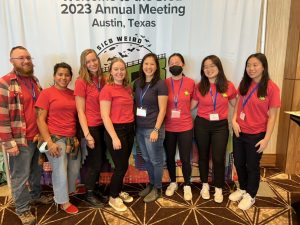
Featured Student Talk
We asked undergraduate student Mary Campbell to describe the research from her fascinating DEDE talk!
Mary Campbell
Undergraduate Researcher, Jessica Hua’s Lab, University of Wisconsin, Madison
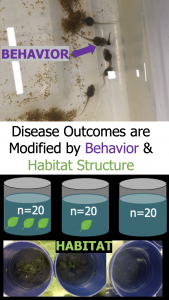
Anthropogenic factors, such as physical and chemical modification of environments, can interact with natural factors to influence host-parasite interactions. Specifically, wildlife hosts face selective pressure by anthropogenic factors to adapt traits that allow them to persist in the face of environmental change. For example, wood frog (Rana sylvatica) populations can vary in their tolerance to the environment pollutant of pesticides. Our experiment sought to ask how natural factors, in this case habitat structure, interact with evolutionary history to influence disease outcomes in the face of an amphibian pathogen, Frog-Virus-3 (FV3). We artificially generated populations of pesticide tolerant and non-tolerant wood frogs. We introduced them into one of two mesocosm experiments that manipulated habitat structure as it relates to (1) vegetation density or (2) water depth. In the first experiment we found that individuals in the high vegetation treatment had higher survival and higher viral loads than the no vegetation treatment. In the second experiment we found an interactive effect of depth (shallow vs deep) and evolutionary history (pesticide tolerant vs non-tolerant) on survival whereby pesticide tolerant populations had higher survival in the shallow compared to deep environment and non-tolerant populations had lower survival in the shallow compared to deep environment. Focusing in on the shallow treatment, we found a higher percentage of necrophagy, a tadpole behavior which can spread disease, in non-tolerant units than pesticide tolerant units. These findings suggest that altered behavior between the pesticide tolerant and non-tolerant populations drove differences in disease outcomes in the shallow treatment.
Meet An Ecoimmunologist/Disease Ecologist
Once again this year, we had a great turnout for our “Meet an Ecoimmunologist/Disease Ecologist” event with both in-person and virtual meetups between student/post-docs and faculty working in Ecoimmunology and Disease Ecology. Thank you to all the student/post-doc mentees and our 11 mentors that participated this year!
Looking Ahead: SICB 2024 (Seattle, WA) & SICB 2025 (Atlanta, GA)
As we look forward to the SICB 2024 meeting in Seattle, WA (January 2-6, 2024), it is shaping up to be another outstanding meeting. We are excited to announce that DEDE will be co-sponsoring two symposia: 1) Immunity in the ‘omics age: what can ‘omics approaches tell us about immunity in natural systems? organized by Lauren Fuess and Nikki Traylor-Knowles and 2). The scale of resilience: mechanisms of recovery across biological systems, organized by Emily Le Sage and Corinne Richards-Zawacki.
To ensure that DEDE continues to grow and thrive, it is important that DEDE members continue to host ecoimmunology/disease-related symposia. We are now soliciting proposals for symposia for the SICB 2025 meeting in Atlanta, GA (January 3-7, 2025). Symposia are eligible for NSF funding, and symposia that have complementary sessions/associated workshops and invited speakers from diverse institutions across a range of career stages are most likely to receive NSF funding. If you have an idea, email our Program Officer at dpo.dede@sicb.org or the SICB program officer (Thomas Sanger) at programofficer@sicb.org for more details or information. We also have sample NSF proposals that we can share. We highly encourage senior graduate students and post-docs to submit proposals, as a symposium is an excellent way to network with researchers in your field, to highlight a research area you think is exciting, and to help shape future programming at SICB.
Thank you for your ongoing participation and support of DEDE events, and thanks again to all who volunteered to judge student presentations. We sincerely hope to see you all in person in Seattle next January!
Outgoing DEDE Officers
Thank you to the two amazing, outgoing DEDE officers who certainly made our division better for its members!
Dr. Patricia Lopes
Assistant Professor, Chapman University, Secretary-Elect: 2020-21, Secretary: 2021-23
Dr. Patricia C. Lopes studies how social interactions affect and are affected by host-parasite interactions. For example, her group recently found that neuromolecular responses to a simulated infection differ depending on an animal’s social environment (https://doi.org/10.1016/j.bbi.2023.03.004). This work is done at a primarily undergraduate university (Chapman University), where the Lopes lab is mostly composed of undergraduate students. Dr. Lopes’ years as the DEDE Secretary-Elect and Secretary were marked by a global pandemic, which she felt was “bittersweet, because while it highlighted the importance of the type of work done by our division, it really reduced the joy of the live interactions at SICB meetings.” During those years, she helped bring the division’s webpage live, update our bylaws, resuscitate the division’s new investigator award, and re-imagine the content of our newsletters.
To follow her group’s work, please visit: Website: http://www.patriciaclopes.com/; Twitter handle: @ProfPatiLopes
Dr. Laura Mydlarz
Professor, Associate Dean, College of Science, The University of Texas at Arlington, Program Officer-Elect: 2019-21, Program Officer: 2021-23
Dr. Laura Mydlarz is a professor of Biology and Associate Dean at the University of Texas in Arlington, TX. Her lab studies coral immunity and disease. Laura really enjoyed her time as Program Officer for DEDE, even though most of it was during COVID shutdowns. She particularly enjoyed the programming meeting weekends in Phoenix and Austin (even though she never got to attend the phoenix meeting due to COVID) and was happy to finally see first-hand the product of all the hard work at the 2023 meeting in Austin. Programming a meeting is very interesting and it was amazing to see how much goes on behind the scenes. During her time as PO, she navigated a change in meeting platforms, discussed improvements to the Best Student Presentation, programmed a huge number of great DEDE student presenters, brought the early investigator Lochmiller Award back, and updated our bylaws. She is particularly happy that DEDE will sponsor 2 symposia at the Seattle meeting and bring incredible disease ecologists and eco-immunologists to the meeting.
To follow her group’s work, please visit: Website: www.themydlarzlab.com; Twitter handle: @LauraDMydlarz and @CoralDoctors
2023 DEDE Elections
This Spring, DEDE will vote to elect two officers (see candidate biographies below), and we will vote on divisional bylaws amendments that keep our division in line with changes to the society-wide bylaws. Please find the ballot here.
DEDE Program Officer-Elect Candidate
Robin Warne
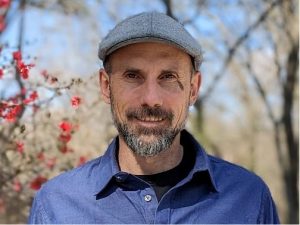
Current Position: Associate Professor, School of Biological Sciences, Southern Illinois University
Education: B.A. University of California at Santa Cruz (1996), PhD. University of New Mexico (2008)
Professional Experience: Associate Professor, Southern Illinois University (2017-present); Assistant Professor, Southern Illinois University (2011-16); Postdoctoral Fellow, Vassar College (2009-11)
SICB Activities: SICB Member since 2005; Divisional member in DEDE, DCPB, DEE, and DCE; Secretary for DCPB (2016-18); Developed symposium in collaboration with Dan Hahn (U. Florida) for 2014 SICB meeting titled “The micro and macro of nutrient effects in animal physiology and ecology”; Associate Editor for Physiological and Biochemical Zoology (2018-present); Judge for Best Student Presentations (DEDE, DCPB, and DEE); 30 oral and poster presentations at SICB (includes mentored students, 2006-2022).
Other Memberships: American Physiological Society; Ecological Society of America; American Society of Ichthyologists and Herpetologists; Sigma Xi; Global Ranavirus Consortium (GRC)
Research Interests: Research in my lab explores the physiological ecology of resource allocation to life history processes in relation to environmental stressors and emerging disease. Most recently we have explored the roles gut microbiomes play in amphibian developmental physiology and susceptibility to ranavirus, an emerging disease of ectothermic vertebrates. We integrate approaches from ecoimmunology, stable isotope physiological ecology, and endocrinology in both field and lab studies focused on amphibians, reptiles, small mammals, birds, and insects. Ongoing research in my lab includes how microbiomes affect immunity and disease in amphibians as well as hibernating snakes, small mammal microbiome and inflammatory immune effects on fitness, and ecophysiology of amphibian thermal biology and osmoregulation.
Statement of Goals: I am honored to be nominated as a candidate for Program Officer for DEDE. I “grew up” within SICB as a grad student, postdoc, and now mentor to a new generation of society members; and I greatly value the wealth of knowledge, experiences, and collegial friendships I have gained by regularly attending our meetings. I have also been a member and participated with DEDE since its inception. Given these experiences, I am excited by the prospect of giving back to this great society, division, and community of scientists. If elected Program Officer, I would work to encourage broad engagement among the DEDE and SICB membership as a whole through recruiting symposia that integrate and highlight diverse research in ecoimmunology and disease ecology. I would also endeavor to promote student, postdoc, and interdisciplinary involvement in DEDE in order to support and encourage a thriving, interactive community within SICB, both now and into the future.
DEDE Secretary-Elect Candidates
Mike Butler
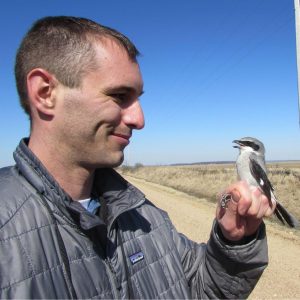
Current position: Associate Professor of Biology, Lafayette College
Education: B.A. Bowdoin College (2002); M.S. Boise State University (2006); Ph.D. Arizona State University (2012)
Professional Experience: Associate Professor, Department of Biology, Lafayette College (2018-present); Assistant Professor, Department of Biology, Lafayette College (2012-2018)
SICB Activities: Member of DEDE (2005-present); Meet/Lunch with an Ecoimmunologist/ Disease Ecologist Mentor Meetup (2019, 2022, 2023); Lunch with a Comparative Endocrinologist (2023); Code of Conduct Ally (2020, 2023); reviewer for DEDE’s Lochmiller award (2022)
Other Memberships: American Ornithological Society, Sigma Xi
Research Interests: The research in my lab broadly investigates how animals meet challenges posed by the environment. Using captive and free-living animals (usually birds), we examine a host of these challenges, for example by simulating infection, modifying diets, applying handling stress, presenting model predators, or removing parasites. We then collect data on how animals respond by measuring oxidative physiology, circulating nutrient levels, behavioral responses, immune responses, or production of colorful structures. https://sites.lafayette.edu/butlermw/
Statement of Goals: I would be grateful for the opportunity to serve as the SICB DEDE Secretary. I have previously served as chair of both the Early Professionals Committee and the Membership Committee for a different society (AOS), and would bring that experience to SICB. As Secretary, I would be energized to support members of DEDE at all professional stages, as I have demonstrated throughout my career. As chair of the EPC at the AOS, we focused on developing mentoring partnerships and networking events for postdocs and other professionals who had received their terminal degree within the past 10 years. As a professor at a small liberal arts college, I happily spend a lot of my time focusing on the needs of my students. As Secretary of DEDE, I would continue to focus on the professional needs of all our members, which requires the necessary commitment to diversity, equity, and inclusion.
Emily Le Sage
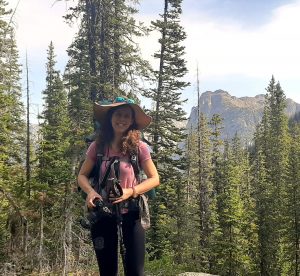
Current Position: Research Assistant Professor, Department of Pathology, Microbiology, and Immunology, Vanderbilt University.
Education: B.S., Michigan State University (2010); Ph.D. Washington State University (2016).
Professional Experience: Postdoc, Vanderbilt University (2017-2021); Postdoc, Temple University (2021-2022); Research Assistant Professor, Vanderbilt University (2022-)
SICB Activities: SICB member since 2015; member of DEDE, DCE, and DEE; Integrative & Comparative Biology reviewer (2021); Symposium participant (2015); Symposium organizer (2024); Symposium participant (2024).
Research Interests: I study how organisms respond physiologically to ecological change and how these responses shape infection and disease dynamics. My research program investigates the strong interdependencies of the neuroendocrine and immune systems of vertebrates to better understand disease ecology and evolution in a rapidly changing world. I address fundamental questions such as how are annual seasonal disease dynamics regulated by biological rhythms, and what are the causes and consequences of host heterogeneity? In two disease systems of interest, recent evidence suggests that some host populations are currently shifting from severe epizootic declines to enzootic recoveries. Thus, my lab capitalizes on this exceptional opportunity to understand underlying eco-evolutionary mechanisms of biological resilience to emerging infectious diseases. website: https://emilymhall88.wixsite.com/mysite
Statement of Goals: I would be proud to serve as the SICB DEDE Secretary because this division has been a place where I have built vibrant connections with inspiring researchers throughout my career. I believe DEDE values a student-centered approach to society meetings, and my goal as a division leader is to leverage these strengths to increase accessibility and success of early career researchers belonging to historically excluded groups. As Secretary, I will be committed to communicating the diverse and unique cultural perspectives that make up our society in newsletters and other media. My professional experiences have taught me the importance of reaching the public through stories of passionate researchers using social media and outreach events, and I plan to work with the division to increase our impact through increased public engagement with science and technology.
